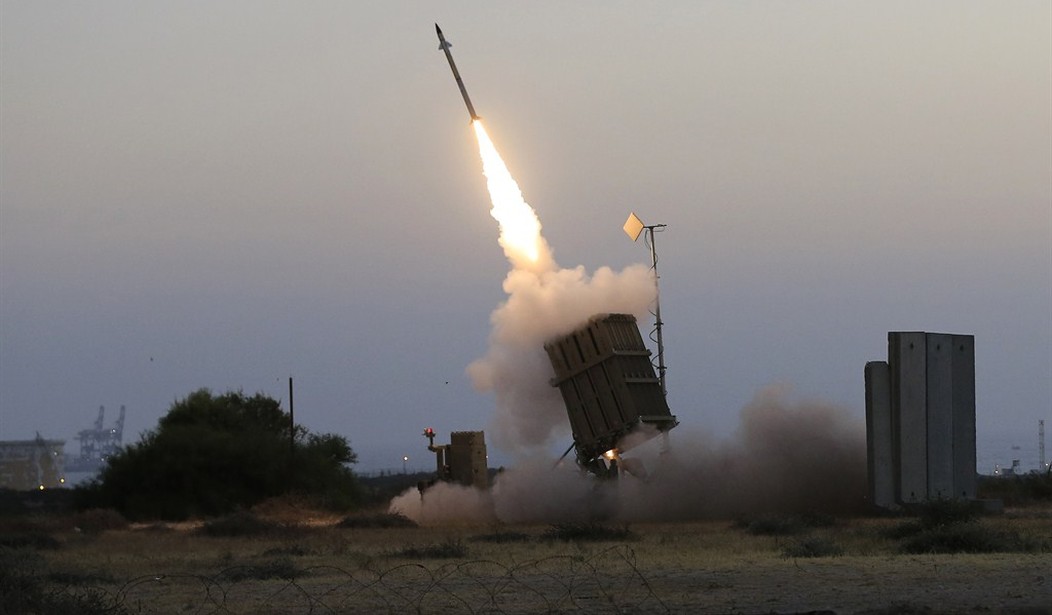According to the Israeli government, in this latest round of Israel-Hamas combat, Israel's Iron Dome missile defense system has (so far) intercepted 90 percent of targeted incoming Hamas rockets.
Iron Dome is a very sophisticated tactical (short-range) anti-missile and anti-artillery projectile defense system. In terms of combat operations, Iron Dome's "sensor-shooter" system is a drastically scaled-down strategic anti-missile defense system, a mini-ABM system in the mold of the Reagan administration's Strategic Defense Initiative. In fact, Iron Dome is an SDI descendant and a cousin of the current U.S. Missile Defense program. I will return to the cousin connection in a moment.
For good reason the 2006 Israel-Lebanese Hezbollah War is also called "The Rocket War." Hezbollah fired several thousand unguided rockets into Israeli territory.
Human Rights Watch, a non-governmental human rights organization, accused Hezbollah and the Israeli Defense Forces of launching "indiscriminate" attacks that killed civilians on both sides of the border. As usual, HRW's legalistic accusations against Israel received more international media attention. Though Hezbollah rocketeers frequently fired from positions within civilian neighborhoods (as Hamas rocket teams are doing in 2014), HRW argued that the Israelis "failed to distinguish between civilian and military targets." HRW berated the IDF for employing cluster munitions.
However, to its credit, HRW's detailed 2007 investigation of Hezbollah confirmed the harsh but obvious conclusion that Hezbollah had "deliberately targeted" civilian areas within Israel. HRW's report concluded that, "Hezbollah repeatedly fired rockets in the direction of civilian-populated areas in which there was no evident military target."
Recommended
An HRW press release summarizing the investigation said that indiscriminate rocket fire directed at densely populated civilian neighborhoods "killed or injured civilians in Jewish, Arab and mixed villages, towns and cities." In other words, Hezbollah wanted to spill civilian blood -- lots of blood -- and if it happened to be Arab blood, so be it.
HRW investigators did not dispute Israeli casualty statistics. Hezbollah's 2006 rocket and artillery barrages killed 43 civilians. 101 civilians suffered grave injuries and 1,388 civilians "suffered light physical injuries."
Israel's population in 2006 was a little over seven million. 1,532 Israeli civilian casualties in 2006 is the equivalent of 70,000 U.S. civilian casualties in a 2014 population of 320 million. Ask yourself this: Would the American people want their government to respond vigorously if an enemy inflicted 70,000 civilian casualties?
Like Iron Dome, deploying theater and strategic missile defense systems are one type of response; mass air raids on enemy cities by B-52s and B-2s are another.
In the last two weeks, Iron Dome has demonstrated that it can successfully protect people. Several press reports have noted the Israeli claim that Iron Dome's demonstrated capabilities have given the Israeli government something very precious in a crisis: time. Instead of facing demands to strike back immediately, the government can consider military and political options.
Iron Dome's success, however, has already bred the curious concern that Israel will refuse to consider diplomatic options in dealing with the Palestinians. A rather histrionic Washington Post blog post (July 14) made this crabbed argument.
Over the last 20 years I have made the case that missile defense promotes constructive strategic diplomacy -- diplomacy that goes beyond negotiating short-term ceasefires and begins to build long-term peace.
Threats emerging over the last two decades have made it clear that we are engaged in a global battle between the constructive and the destructive -- constructive nations desiring peace and economic development confronted by destructive, extortionist states, neo-imperialist regimes and transnational terror organizations. For the destructive clan, missiles, particularly those armed with weapons of mass destruction, are marquee weapons.
Missile defense pays an essential military, political and psychological role in this global battle. Defending American citizens is the U.S. missile defense system's first priority. However, the ability to protect allies and neutrals generates diplomatic power. The system's very existence serves as a psychological counter to thug intimidation and thus creates political space for other diplomatic endeavors to counter the rogue state threat.

























Join the conversation as a VIP Member